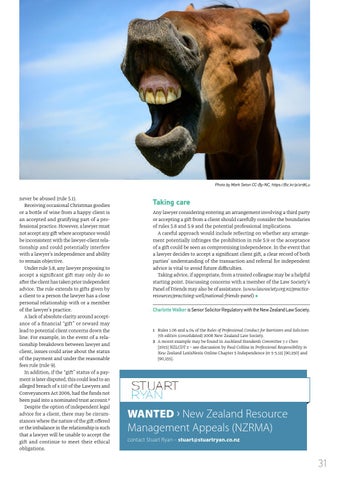Photo by Mark Seton CC-By-NC, https://flic.kr/p/xrdtLu
never be abused (rule 5.1). Receiving occasional Christmas goodies or a bottle of wine from a happy client is an accepted and gratifying part of a professional practice. However, a lawyer must not accept any gift where acceptance would be inconsistent with the lawyer-client relationship and could potentially interfere with a lawyer’s independence and ability to remain objective. Under rule 5.8, any lawyer proposing to accept a significant gift may only do so after the client has taken prior independent advice. The rule extends to gifts given by a client to a person the lawyer has a close personal relationship with or a member of the lawyer’s practice. A lack of absolute clarity around acceptance of a financial “gift” or reward may lead to potential client concerns down the line. For example, in the event of a relationship breakdown between lawyer and client, issues could arise about the status of the payment and under the reasonable fees rule (rule 9). In addition, if the “gift” status of a payment is later disputed, this could lead to an alleged breach of s 110 of the Lawyers and Conveyancers Act 2006, had the funds not been paid into a nominated trust account.2 Despite the option of independent legal advice for a client, there may be circumstances where the nature of the gift offered or the imbalance in the relationship is such that a lawyer will be unable to accept the gift and continue to meet their ethical obligations.
Taking care Any lawyer considering entering an arrangement involving a third party or accepting a gift from a client should carefully consider the boundaries of rules 5.8 and 5.9 and the potential professional implications. A careful approach would include reflecting on whether any arrangement potentially infringes the prohibition in rule 5.9 or the acceptance of a gift could be seen as compromising independence. In the event that a lawyer decides to accept a significant client gift, a clear record of both parties’ understanding of the transaction and referral for independent advice is vital to avoid future difficulties. Taking advice, if appropriate, from a trusted colleague may be a helpful starting point. Discussing concerns with a member of the Law Society’s Panel of Friends may also be of assistance. (www.lawsociety.org.nz/practiceresources/practising-well/national-friends-panel) ▪ Charlotte Walker is Senior Solicitor Regulatory with the New Zealand Law Society.
1 Rules 1.06 and 4.04 of the Rules of Professional Conduct for Barristers and Solicitors 7th edition (consolidated) 2008 New Zealand Law Society. 2 A recent example may be found in Auckland Standards Committee 5 v Chen [2015] NZLCDT 2 – see discussion by Paul Collins in Professional Responsibility in New Zealand LexisNexis Online Chapter 5 Independence (rr 5-5.12) [90,250] and [90,255].
WANTED › New Zealand Resource Management Appeals (NZRMA) contact Stuart Ryan – stuart@stuartryan.co.nz
31
